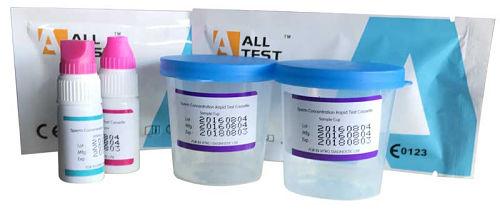New data shows there’s been a huge increase in the request for home sperm testing, while clinic research indicates that men now represent half of all fertility cases. A 2017 study revealed that, over the past decade, there’s been a doubling in the percentage of men requiring fertility treatment, with the figure increasing from 12.4% to 21.3%.
Researchers believe there are a number of reasons why there has been an increase in male infertility and are now looking at environmental toxins and lifestyle choices as two of the major contributory factors.
What Is It That Negatively Affects the Quality of Sperm?
When it comes to fertility and the quality of sperm, men often overlook the importance of a healthy lifestyle. Poor lifestyle choices and habits can have a negative effect on sperm count and motility, which can ultimately lead to infertility. Unfortunately, there are many things that can negatively affect the quality of sperm.
Smoking is one of the biggest contributors to poor sperm quality. The nicotine from cigarettes and other tobacco products constricts blood vessels, reducing blood flow to the reproductive organs. This can reduce the production of healthy sperm and can lead to DNA damage, affecting the quality of sperm. Quitting smoking is the best way to improve sperm quality and the chances of conception.
Alcohol has also been linked to poor sperm quality. Alcohol consumption can reduce testosterone levels and reduce the quantity and quality of sperm. The World Health Organisation recommends limiting alcohol consumption to a maximum of two drinks per day to ensure healthy sperm production.
Excessive exposure to heat can also negatively affect sperm quality. The temperature in one’s testes should be a few degrees lower than the rest of the body in order to produce healthy sperm. Too much heat can reduce the production of healthy sperm, leading to decreased fertility. Men should avoid wearing tight clothing, sitting in hot tubs, and using electric blankets to avoid overheating.
Scientists are learning more and more about the factors that can affect sperm quality. Most of us are aware that exposure to pesticides and chemicals can affect the quality of sperm, as can painting materials, solvents, and agricultural chemicals. We also know that environmental factors can affect the mobility of sperm and have a negative impact on sperm count.
Exposure to certain chemicals and toxins can also have an adverse effect on sperm quality. Exposure to toxic chemical fumes, lead, and other heavy metals can damage the sperm and reduce the chance of conception. Men should avoid contact with chemical and hazardous materials as much as possible to protect their fertility.
Finally, poor diet and lack of exercise can negatively affect the quality of sperm. Eating a diet high in processed, unhealthy foods can reduce the production of sperm. Eating more fresh fruits and vegetables, whole grains, healthy fats, and lean proteins can produce healthier sperm. Also, exercising regularly can help increase testosterone production and improve the quality of sperm.
How to Conduct a Home Male Fertility Test
Any couple who has struggled to conceive a baby understands only too well how difficult and emotionally draining this time can be. If you feel that your lack of being able to conceive may be caused by a fertility problem, then perhaps it’s time for a sperm quality check-up. Better to find out what the issue is now than to continue the heart-breaking journey of continuously failing to conceive.
The typical procedure for a sperm test is that a man collects his ejaculatory in a cup. Men have been undergoing this procedure day-in day-out over a long period of time, however there are many men who understandably find the thought of this procedure difficult or too embarrassing to carry out at their local GPs surgery or clinic.
At-home sperm testing has become a very popular way for men to carry out male fertility testing in the privacy and comfort of their own home. Buy the Zoom Baby Home Sperm Test Kit here.
Explaining How a Home Sperm Test Works
Using masturbation, the male expels his semen into the collecting cup provided with the test, then allows the semen to rest for 15 minutes. Next, using the pipette, a semen sample should be dropped onto the testing well. Testing results will be available in just a couple of minutes.
Handy Tips:
- There should be no sexual activity for a period of 3 to 7 days prior to taking the test.
- Full instructions are included in every testing kit, so make sure you read the instructions carefully before testing.
After My Home Sperm Test — What Next?
The purpose of male at-home fertility testing is to determine whether the sperm count is more or less than 20-million sperm per ml. Your test result will clearly show a negative or positive result.
What if it’s a negative result? If you receive a negative result, we suggest you carry out a second test. If the result of your second test also displays a negative result, it’s time to seek advice from your GP. Your GP will advise you on the next course of action, which may be further testing to reveal possible problems.
What if it’s a positive result? Achieving a positive result from your fertility test doesn’t automatically mean you don’t have a fertility problem. Make the appropriate lifestyle adjustments (as below) and if you’re still unable to conceive, we strongly suggest you speak to your GP about further testing.
How Can I Improve My Chances of Conceiving a Baby?
According to the NHS, the following are recommended to improve your chances of conception —
- Ideally, you will be having sex with your partner on a regular basis — 2 to 3 times per week.
- Keep your alcohol consumption down to no more than 14 units per week.
- Avoid drugs at all costs and quit smoking!
- Wear loose clothing and move around as often as possible to prevent your testicles from overheating.
- Make sure you exercise, consume a healthy diet, and maintain a good weight.
- We strongly suggest that during sex you use a sperm-friendly lubricant.
- It’s really important that you reduce your stress as much as possible.
- Try to get 7 to 8 hours of good-quality sleep each night.
The Role of Stress in Male Fertility
Stress can play a significant role in male fertility, yet it’s often overlooked. Chronic stress can lead to hormonal imbalances, affecting testosterone levels and sperm production. It may also contribute to lifestyle choices that harm fertility, like poor diet or increased alcohol consumption.
To combat stress-related fertility issues:
- Practice relaxation techniques like deep breathing or meditation
- Exercise regularly to boost mood and reduce stress hormones
- Get enough sleep – aim for 7-9 hours per night
- Talk to a therapist or counsellor if needed
- Prioritise work-life balance
Remember, addressing stress isn’t just good for your fertility – it’s crucial for your overall health and well-being.
Photo by Anthony Cunningham for Zoom Baby
This post first appeared in July 2022 and has been updated since
Zoom Baby is a leading supplier of Pregnancy Tests and Ovulation Test Kits






